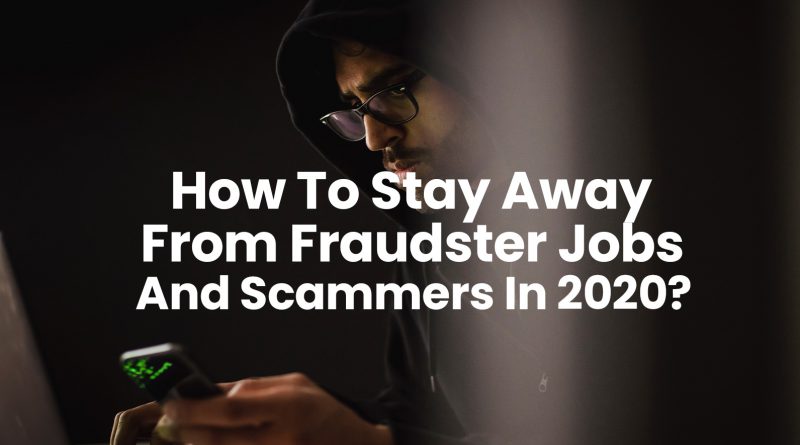How To Stay Away From Fraudster Jobs And Scammers In 2020
Job portals are platforms that bring job seekers and employers together. These portals are used by numerous corporate, placement companies, and recruitment firms. The usage of job portal sites is bound by a set of terms and conditions that the employers must agree and adhere to. One of the primary objectives of this article to discourage and prevent misuse and fraud.
Regrettably, sometimes, false job postings are listed online, and non-existing job offers are sent via email to illegally collect personal information and/or money from unsuspecting job seekers.
To tackle such cases, you need to remain vigilant every day – when you receive fraudulent or suspicious emails, we promptly urge you to notify the concerned job portal, thereby removing the job from the job sites immediately and block them future job portals. Even we, at Teamlease use extreme measures to ban these scammers and fraudsters.
Be wary of emails that
- ask your personal, non-work related information such as Credit Card numbers or Bank information over phone or email
- do not provide valid contact information
- ask for monetary transactions, money-transfers, or payment for any employment/recruitment related purpose
- promise emigration and ask for money to process visa, etc
- Before you respond to such emails, we suggest you do a discreet enquiry and be sure to verify the legitimacy of the employer with whom you are interacting.
- Educate yourself against Fraud/Scams
- We encourage you to read the following and make yourself aware of the warning signs of the most common kinds of Internet and email frauds.
There are two types of email scams – ‘phishing’ and ‘spoofing’. In both, cases, the ‘from address’ is forged to make it appear as if it came from a source that it actually did not come from. Here we explain the 2 kinds of email scams:
Phishing
Phishing is an attempt by fraudsters to ‘fish’ for your personal details. A phishing attempt is usually in the form of an e-mail, which encourages you to click a link that takes you to a fraudulent log-on page designed to capture your account/password/personal details. These emails can also be used to lure the recipient into downloading harmful software. Please note that Teamlease.com will never ask you to download software in order to access your account.
Spoofing
Spoof emails usually include a fraudulent offer of employment and/or an invitation to perform a monetary transaction. Such email scams are, unfortunately, common across the world and could target anyone – including unsuspecting job seekers who have registered with Teamlease.com may not have provided the entire contact information, such as the correct physical address, phone numbers, and email ID.
The precautionary measures jobseekers could take to protect themselves against suspected spoof emails have been mentioned above.

How can you check if an employer or a recruiter is fraud or genuine?
Below are a few things we can suggest you could try (you are encouraged to exhaust all possible ways, not just be limited to the following) to ascertain the legitimacy of the employers who contact you:
- Have you heard the name of the company before?
- Do you remember applying to this particular company or did the offer come unsolicited?
- Does the domain name in their email address match the name of the company? For example, if you get a job offer from XYZ cement company, and their email ID is xyzcement@gmail.com or xyzcement@yahoo.com, then it’s a fake company. Real companies use their own domain name on their email and do not use free email providers.
- Search on Yahoo, Google, or MSN to see if the company has a genuine website. Also, check if other people have reported that the employer has been involved in job scams previously.
- Note the country that the company claims to be working in, and offering you a job in. Most fake companies offer scam jobs in Africa, Middle East, Asia, South America, and to a much smaller extent, the US or Western Europe.
- Find out if you need to pay the company for anything. If they ask you to pay – at first or even after some time – for visa, work permit, or for travel, chances are it’s a fake company.
- You should never transfer any money to an individual’s bank account. Any nominal monetary transaction should either be through a portal (like PayU, CcAvenue, etc) or a transfer/DD made to the company bank account. We still ask you to avoid any kind of monetary transaction whatsoever, against offer letters, etc. Genuine companies will never ask for money for recruitment.
Remember, if you have received (or receive) any such suspicious email communication from a possible Teamlease client, do not hesitate to report it to us at info@freshersworld.com. We value your trust in Teamlease.com and are committed to making your job search a safe and secure experience.
Stay safe from fraudsters, and most importantly, stay safe from COVID-19. Have fun, stay home!

